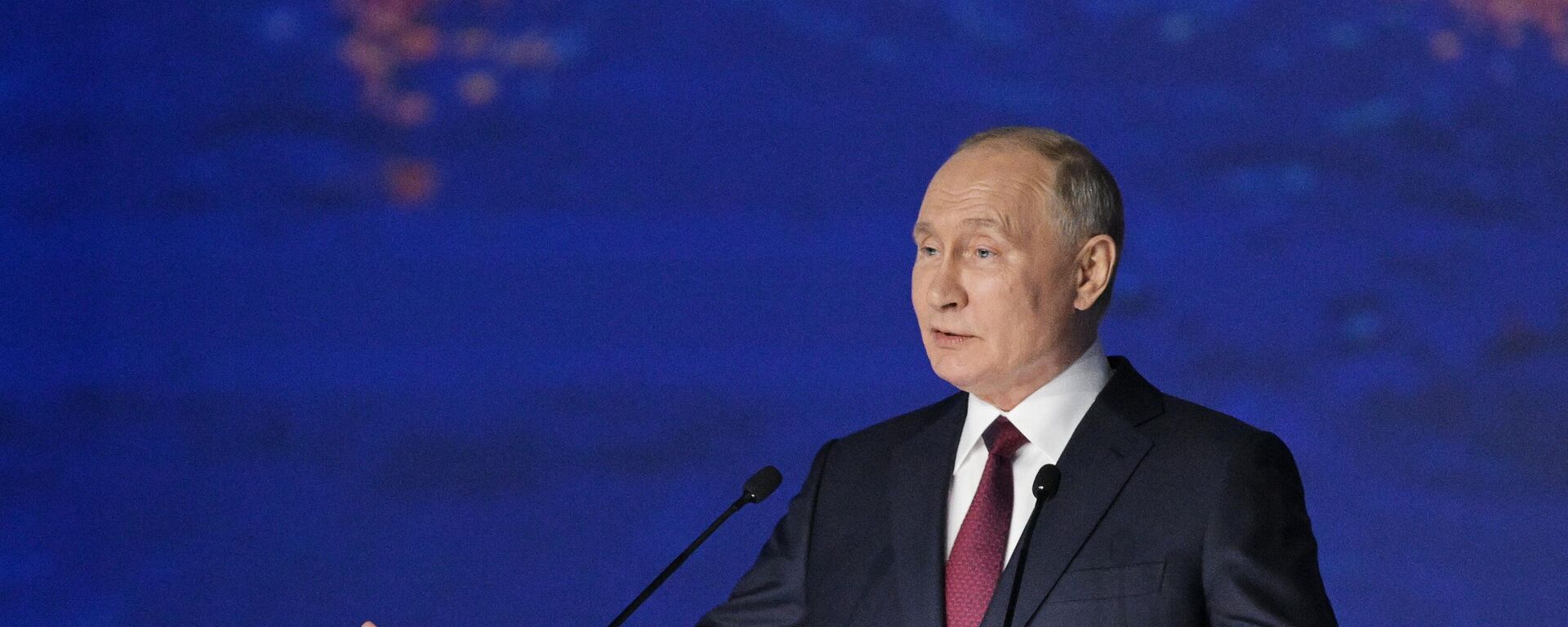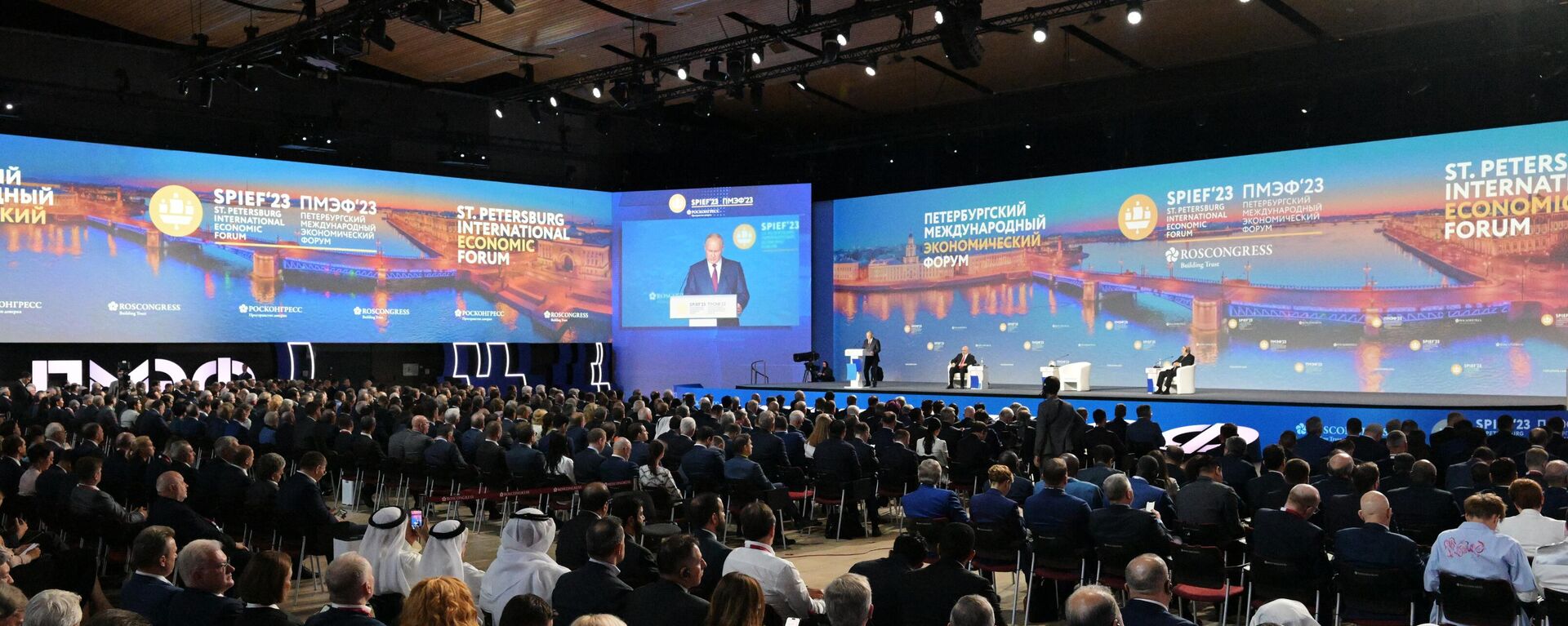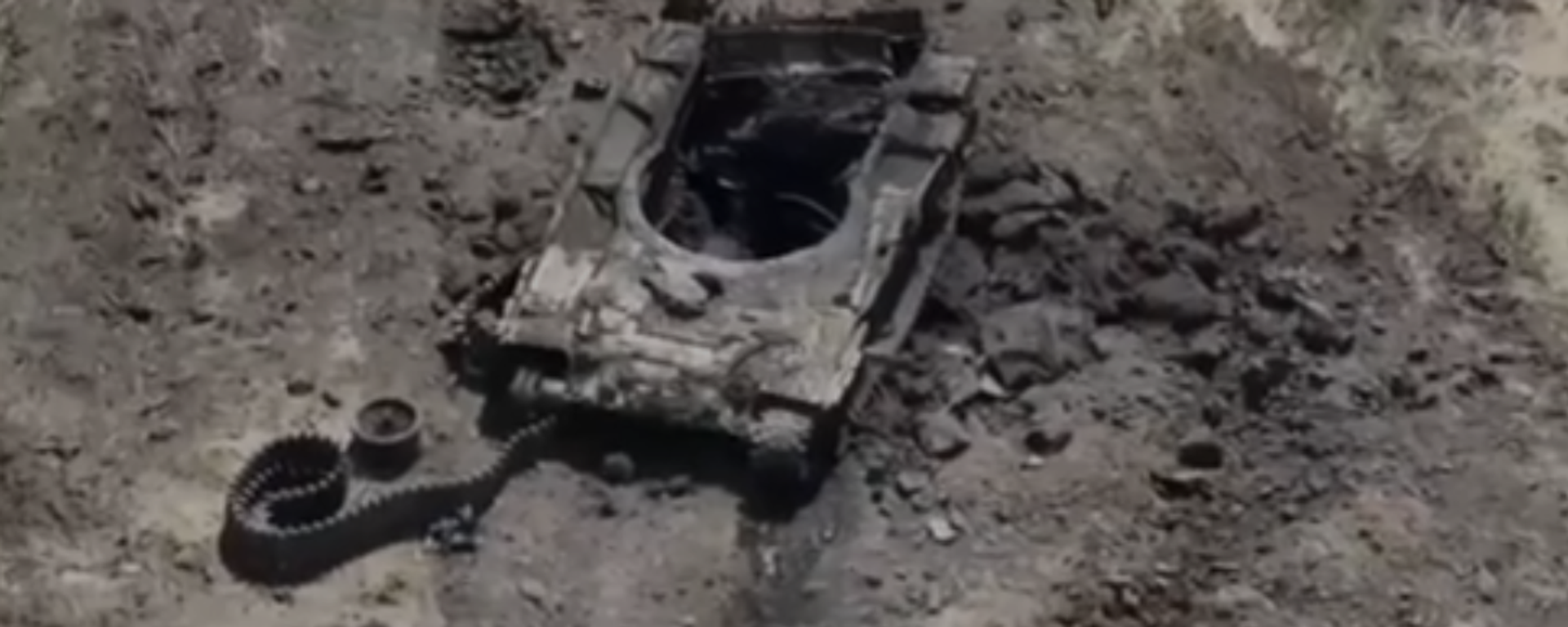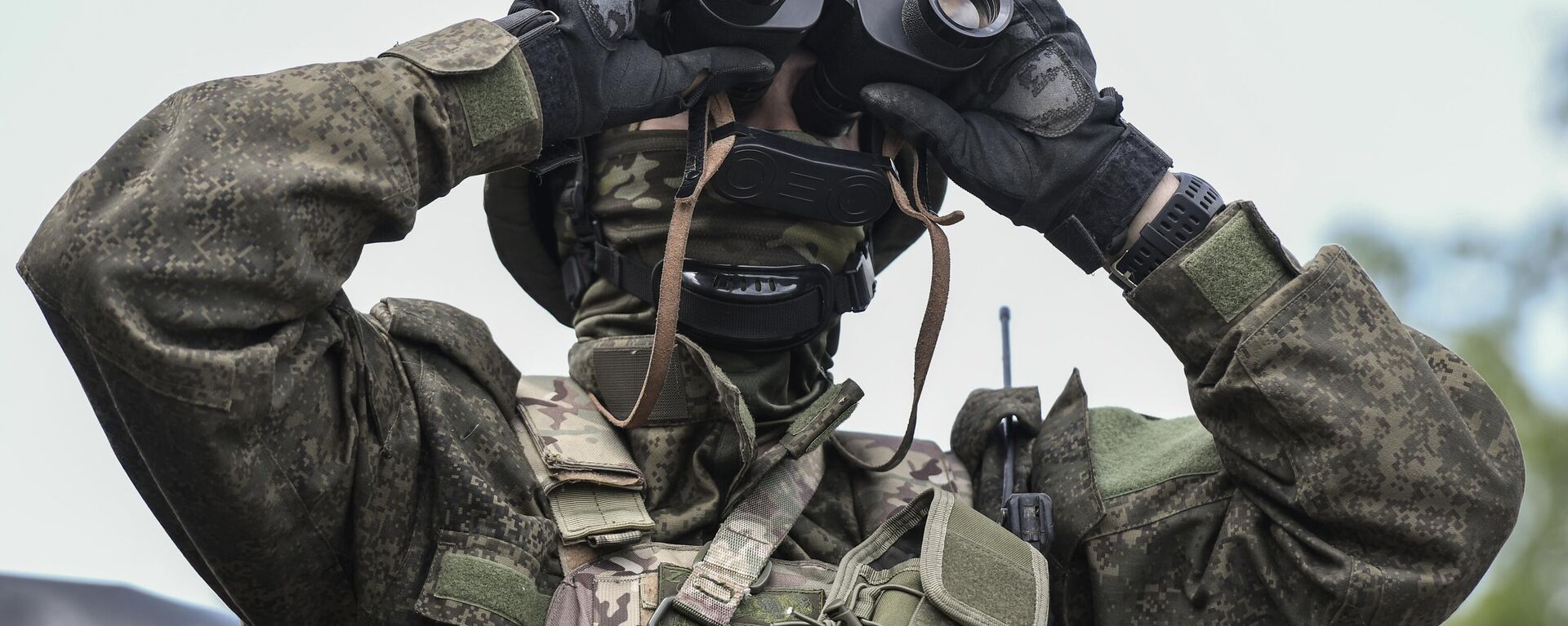https://sputnikglobe.com/20230616/spief-moderator-tells-sputnik-what-putin-is-prepared-to-do-to-protect-russias-interests-1111228470.html
SPIEF Moderator Tells Sputnik What Putin is Prepared to Do to Protect Russia's Interests
SPIEF Moderator Tells Sputnik What Putin is Prepared to Do to Protect Russia's Interests
Sputnik International
The Russian president gave a plenary speech at the St. Petersburg International Economic Forum on Friday, touching on the state of the Russian economy, the enf of Western hegemony, and Ukraine.
2023-06-16T19:45+0000
2023-06-16T19:45+0000
2023-06-17T07:04+0000
world
vladimir putin
joe biden
ronald reagan
russia
ukraine
washington
sputnik
nato
https://cdn1.img.sputnikglobe.com/img/07e7/06/10/1111227022_0:0:2948:1659_1920x0_80_0_0_1995fa9fbde31ad1f3adc30a738ca31e.jpg
Sputnik International deputy director Dimitri Simes got a unique opportunity to speak with SPIEF Plenary Session moderator Dimitri Simes Sr, his father, to get the veteran Russian-American political scientist’s impressions on President Putin’s speech, the subject matter that Putin touched on, and the global geopolitical backdrop against which his remarks were made.The moderator said Putin’s remarks on foreign policy once again demonstrated his qualities as a statesman, noting that he did not sabre-rattle, especially on nuclear weapons, "but...made clear that Russia has a nuclear arsenal," and is prepared to use it as a deterrent.Putin’s Political RealismTaking note of the fact that Putin made his comments at an economic and investment forum, the political scientist said the remarks gave a sense of Russia's striving "to have not just an element of normalcy, but really normal economic development under these most difficult circumstances." Putin offered important hints on “what it takes, how it works," with a focus on Russian sovereignty, Simes senior said.Juxtaposing Putin’s comments on foreign policy with his emphasis on the importance of free markets and cutting regulation, Sputnik’s Dimitri Simes said that the comparison that immediately came to his mind as an American was Ronald Reagan.Taking note of the fact that Putin made his comments at an economic and investment forum, the political scientist said the remarks gave a sense of Russia’s striving “to have not just an element of normalcy, but really normal economic development under these most difficult circumstances.” Putin offered important hints on "what it takes, how it works,” with a focus on Russian sovereignty, Simes senior said.se of responsibility and political realism."The political scientist, who served as an informal foreign policy advisor to Richard Nixon, and who knew Reagan, said he got the sense that Russia’s president is "quite serious" about the challenge Russia is facing from NATO, balancing efforts to make "very clear that Russia would do whatever it takes not to allow anyone to defeat it" with a calm, non-militaristic or braggadocios position on the country’s military capabilities.Hardball Questions ‘Mine and Mine Only’Simes revealed that the tough and pointed geopolitical and military questions he asked Russia’s president did not undergo any form of moderation, or the requirement to “consult” with or take notes from anyone surrounding Putin.Putin and his aides did not actually know what specific questions Simes Senior planned to ask before he asked him, he said, reiterating that he had “total latitude” to ask whatever he wanted.Ukraine ImbroglioAsked for his views specifically on Putin's answers regarding the ongoing NATO-Russia proxy war in Ukraine, and the disastrous bogging down of Kiev’s counteroffensive, the moderator said he came away impressed by the Russian president’s grasp on the information about the conflict."First of all, if you are talking about the specifics, there was no contradiction with what you would read in the New York Times and the Wall Street Journal and what President Putin had described. That there were some minimal Ukrainian advances, that these advances were not strategic, not even quite tactical, but very minimal, that the Ukrainians have suffered considerable losses, but also somewhat limited losses. President Putin mentioned the numbers, they were impressive, but not huge. He acknowledged that the Ukrainians did not used all their forces, but he also stated categorially that the Ukrainians were not able so far to penetrate even the first line of Russian defenses. And mind you I asked him about that based on what I read in the Wall Street Journal and the New York Times," Simes Senior said.As far as Putin’s answer to questions regarding the much-talked about issue of nuclear weapons, including the transfer of Russian nukes to Belarus, Simes Senior said he felt his answers were “masterful,” and based on a desire to avoid being accused of “warmongering,” and of making headlines in Western media about him coming to the forum to “threaten the world with nuclear war.”Putin conveyed that he was “more than aware of their existence, of their importance, and that anyone thinking about pressuring Russia had to take into account that those weapons were an important component of the Russian military arsenal,” he added.Takeaways for BidenAsked what conclusions he, as a Washington insider, feels President Biden should draw from Putin’s remarks, Simes Senior said that first of all, the US leader should understand that his Russian counterpart’s optimism about the country’s economic development is real, “and that Putin does not feel that he is on the ropes,” or that Russia has been “isolated” by the West’s pressure.“Having said that, Putin had warned Georgia about not touching South Ossetia. When it was disregarded, Russia has used force. Putin warned President Obama not to try to overthrow [Syria’s] President Assad. This advice was disregarded and Russia used military force. After an illegal coup d’etat in Kiev in 2014, Putin said that Russia cannot abandon its compatriots in Crimea and other Russian-speaking areas of Ukraine. That was disregarded, and Putin used military force. I do not know what else is necessary to demonstrate to Washington, Brussels and London that Putin clearly is not a warmonger –he clearly prefers peace. It’s very clear that he understands the centrality of military force in one world, and he is not above using military force when necessary,” the political scientist stressed.Simes Senior pointed out that Putin’s so-called ‘red lines’, which neoconservatives in Washington have bragged about trampling over in Ukraine, were never presented by Putin himself.
https://sputnikglobe.com/20230616/multipolar-world-order-strengthening-this-is-an-inevitable-process---putin-1111216858.html
https://sputnikglobe.com/20230616/putin-addresses-spief-2023-plenary-session-1111203695.html
https://sputnikglobe.com/20230616/putin-on-ukraines-counteroffensive-kiev-lost-186-tanks-418-armored-vehicles-losses-mounting-1111221996.html
https://sputnikglobe.com/20230611/botched-start-of-ukraines-counteroffensive-probably-extremely-frustrating-for-biden-1111065390.html
russia
ukraine
washington
Sputnik International
feedback@sputniknews.com
+74956456601
MIA „Rosiya Segodnya“
2023
News
en_EN
Sputnik International
feedback@sputniknews.com
+74956456601
MIA „Rosiya Segodnya“
Interview with Dimitri Simes Jr. from Sputnik International and Dimitri Simes Sr. - host of the panel with Vladimir Putin at the #SPIEF2023
Sputnik International
Interview with Dimitri Simes Jr. from Sputnik International and Dimitri Simes Sr. - host of the panel with Vladimir Putin at the #SPIEF2023
2023-06-16T19:45+0000
true
PT19M20S
Sputnik International
feedback@sputniknews.com
+74956456601
MIA „Rosiya Segodnya“
dimitri simes, vladimir putin, speech, questions, st petersburg international economic forum, ukraine, world order, economy, russian economy, dimitri simes interview, putin on nuclear weapons
dimitri simes, vladimir putin, speech, questions, st petersburg international economic forum, ukraine, world order, economy, russian economy, dimitri simes interview, putin on nuclear weapons
SPIEF Moderator Tells Sputnik What Putin is Prepared to Do to Protect Russia's Interests
19:45 GMT 16.06.2023 (Updated: 07:04 GMT 17.06.2023) The Russian president gave a plenary speech at the St. Petersburg International Economic Forum on Friday, touching on the state of the Russian economy under sanctions, the emergence of a new world order challenging Western hegemony, and Ukraine. Sputnik has secured an exclusive interview with the moderator of the forum session where Putin spoke.
Sputnik International deputy director Dimitri Simes got a unique opportunity to speak with SPIEF Plenary Session moderator
Dimitri Simes Sr, his father, to get the veteran Russian-American political scientist’s impressions on President Putin’s speech, the subject matter that Putin touched on, and the global geopolitical backdrop against which his remarks were made.
"I think [the speech] was very powerful and very thorough. It was unexpected in the sense that in the time of war, it was a statement, in general, about how the country is living a normal life and moving forward. And it was, if you like, not a boast –it was with facts, with figures. And so it was impossible not to take it seriously," Simes Senior, the former president and CEO of the Washington-based Center for the National Interest, told Sputnik.
The moderator said Putin’s remarks on foreign policy once again demonstrated his qualities as a statesman, noting that he did not sabre-rattle, especially on nuclear weapons, "but...made clear that Russia has a nuclear arsenal," and is prepared to use it as a deterrent.
Putin’s Political Realism
Taking note of the fact that Putin made his comments at an economic and investment forum, the political scientist said the remarks gave a sense of Russia's striving "to have not just an element of normalcy, but really normal economic development under these most difficult circumstances." Putin offered important hints on “what it takes, how it works," with a focus on Russian sovereignty, Simes senior said.
"At the same time, Putin focused several times on the need to keep the Russian economy open, both to foreign investment and to investors who are inside Russia," he added.
Juxtaposing Putin’s comments on foreign policy with his emphasis on the importance of free markets and cutting regulation, Sputnik’s Dimitri Simes said that the comparison that immediately came to his mind as an American was Ronald Reagan.
Taking note of the fact that Putin made his comments at an economic and investment forum, the political scientist said the remarks gave a sense of Russia’s striving “to have not just an element of normalcy, but really normal economic development under these most difficult circumstances.” Putin offered important hints on "what it takes, how it works,” with a focus on Russian sovereignty, Simes senior said.se of responsibility and political realism."
The political scientist, who served as an informal foreign policy advisor to Richard Nixon, and who knew Reagan, said he got the sense that Russia’s president is "quite serious" about the challenge Russia is facing from NATO, balancing efforts to make "very clear that Russia would do whatever it takes not to allow anyone to defeat it" with a calm, non-militaristic or braggadocios position on the country’s military capabilities.
“I tried to be specific in my questions about the war, listing what is said about this conflict [in Ukraine, ed.] in the American press. And interestingly, he did not dispute what more authoritative American newspapers were reporting about the war. But he managed to present in a way which made clear that he was quite realistic about the capabilities of the other side. But he explained why he thought that Russia would be able to deal with this challenge effectively,” Simes Senior said.
Hardball Questions ‘Mine and Mine Only’
Simes revealed that the tough and pointed geopolitical and military questions he asked Russia’s president did not undergo any form of moderation, or the requirement to “consult” with or take notes from anyone surrounding Putin.
“I was told at the outset that questions would be mine and mine only…We compared notes about what Putin intended to say, and I mentioned what foreign policy issues are considered particularly relevant. It was never a discussion of any specific questions, just basic topics to discuss. I was very comfortable with the topics,” the moderator recalled. “They were quite comfortable about all the topics I suggested. There was no suggestion to drop any topic and there was no suggestion whatsoever that they should treat any topic differently.”
Putin and his aides did not actually know what specific questions Simes Senior planned to ask before he asked him, he said, reiterating that he had “total latitude” to ask whatever he wanted.
Asked for his views specifically on
Putin's answers regarding the ongoing NATO-Russia proxy war in Ukraine, and the disastrous bogging down of Kiev’s counteroffensive, the moderator said he came away impressed by the Russian president’s grasp on the information about the conflict.
"First of all, if you are talking about the specifics, there was no contradiction with what you would read in the New York Times and the Wall Street Journal and what President Putin had described. That there were some minimal Ukrainian advances, that these advances were not strategic, not even quite tactical, but very minimal, that the Ukrainians have suffered considerable losses, but also somewhat limited losses. President Putin mentioned the numbers, they were impressive, but not huge. He acknowledged that the Ukrainians did not used all their forces, but he also stated categorially that the Ukrainians were not able so far to penetrate even the first line of Russian defenses. And mind you I asked him about that based on what I read in the Wall Street Journal and the New York Times," Simes Senior said.
“They were acknowledging that actually the combat was not inside the Russian defenses, but in front of the first line of Russian defenses. And that’s where the Ukrainians were after a week of the offensive,” he added.
As far as Putin’s answer to questions regarding the much-talked about issue of nuclear weapons, including the transfer of Russian nukes to Belarus, Simes Senior said he felt his answers were “masterful,” and based on a desire to avoid being accused of “warmongering,” and of making headlines in Western media about him coming to the forum to “threaten the world with nuclear war.”
“I tried to ask him specific questions in that direction. He made very clear that he is not going to say what he did not want to say. But he also made very clear that nuclear weapons, including tactical nuclear weapons, were an important part of the Russian arsenal, and that nobody should forget about it, and that there may be some extraordinary circumstances when the use of such weapons would become necessary,” the political scientist said.
Putin conveyed that he was “more than aware of their existence, of their importance, and that anyone thinking about pressuring Russia had to take into account that those weapons were an important component of the Russian military arsenal,” he added.
Asked what conclusions he, as a Washington insider, feels President Biden should draw from Putin’s remarks, Simes Senior said that first of all, the US leader should understand that his Russian counterpart’s optimism about the country’s economic development is real, “and that Putin does not feel that he is on the ropes,” or that Russia has been “isolated” by the West’s pressure.
“He is quite optimistic about where Russia is going, and about his leadership ability to deal with all major problems. He also I think would be wise to understand that Russia is not closing any doors to diplomacy. I have asked Putin about that several times, and several times he made clear that Russia is open to a serious dialogue with anyone, including Washington and other Western powers. Last but not least, looking at Putin’s record, one should understand that it’s not the style of Russian diplomacy to issue threats. To tell other powers, particularly great powers that they should be in compliance with somebody else’s requirements, or that they would suffer the most serious consequences. That simply is not the way Putin talks,” Simes Senior said.
“Having said that, Putin had warned Georgia about not touching South Ossetia. When it was disregarded, Russia has used force. Putin warned President Obama not to try to overthrow [Syria’s] President Assad. This advice was disregarded and Russia used military force. After an illegal coup d’etat in Kiev in 2014, Putin said that Russia cannot abandon its compatriots in Crimea and other Russian-speaking areas of Ukraine. That was disregarded, and Putin used military force. I do not know what else is necessary to demonstrate to Washington, Brussels and London that Putin clearly is not a warmonger –he clearly prefers peace. It’s very clear that he understands the centrality of military force in one world, and he is not above using military force when necessary,” the political scientist stressed.
Simes Senior pointed out that Putin’s so-called ‘red lines’, which neoconservatives in Washington have bragged about trampling over in Ukraine, were never presented by Putin himself.
"The neoconservatives and their political allies in the United States and in the global political elite in general were [the ones] presenting those so-called red lines as Putin’s. They never were Putin’s. It is not his style to announce his red lines in advance. It doesn’t mean that these red lines do not exist. It particularly does not mean that there is no military planning in Moscow based on these red lines. So I think if I was President Biden, I would understand that Russia is open for diplomatic business, but also, if necessary, Russia would be prepared to do what Russia would need to do, and that in Putin’s mind, Russia has the capability and if you wish the willpower to do all these things," Simes Senior summed up.








